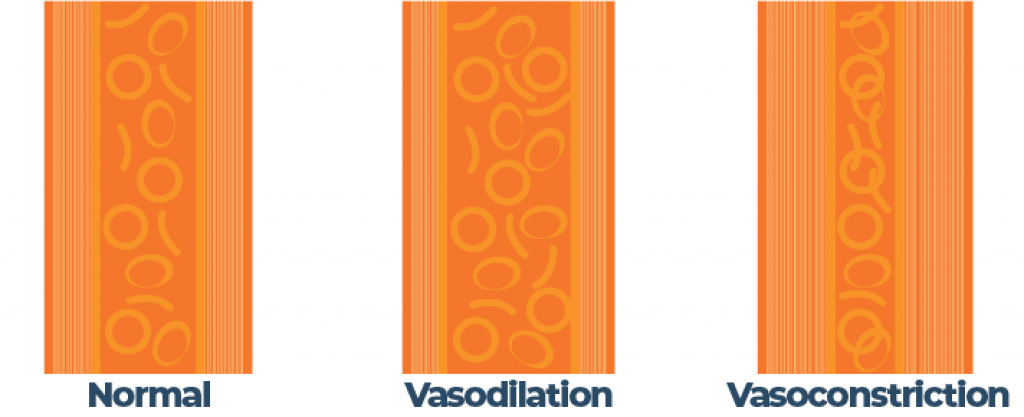We don’t often think about the temperature of our bedrooms unless it’s the middle of summer and we can’t find a single cool spot on the mattress.
What you might not have considered is that it can be game-changer to keep your bedroom cold year-round. Not only are you more likely to fall asleep faster, but you should also get better sleep altogether.
I’ll share the top benefits of keeping your bedroom cooler, as well as tips on how you can cool down your room without cranking up the air conditioner.
8 Benefits of Sleeping in a Cool Room
1. Fall Asleep Quickly
When your circadian rhythm prepares the body for sleep, your body temperature drops1, signaling it’s time to slow down and rest. By keeping your bedroom cooler, you’re reinforcing your body’s natural instinct to sleep. If the room is too hot, it could potentially block that signal and cause it to take longer for you to fall asleep.
Related: Best Mattresses for Hot Sleepers
2. Better Sleep Quality
We’ve all been there — waking up in sweat, thinking there’s no way we can fall back asleep. By keeping your bedroom cooler and regulating the temperature throughout the night, you’ll find that your sleep quality improves.
Another way keeping your room cold can improve the quality of your rest is by stimulating melatonin production2, a hormone that promotes sleep.
You also have a greater chance of experiencing deep sleep if your room is cold. Sleeping in a cool room can help you combat insomnia by lowering your body temperature, which then slows down your metabolism rate. As a result, you don’t spend as much energy during sleep, and you’re less likely to wake up in the middle of the night.
Find Out More: How Thermoregulation Works During Sleep
3. Anti-Aging
As mentioned above, cooler rooms encourage the body to produce melatonin, which, in addition to promoting sleep, is also a powerful anti-aging hormone. Other benefits of increased melatonin3 production are regular menstrual cycles, enhanced moods, weight loss, cancer-fighting properties, and increased brain health.
Read More: Best Melatonin Supplements for Sleep
4. Weight Loss
Who thought you could lose weight when sleeping? Well, it turns out sleeping in a cold room may help you reach your weight loss goals. Again, when your room is set to an optimal, cooler temperature, the melatonin your body produces causes it to store “brown fat”4, which contrary to the name, helps you burn calories instead of storing them.
Learn more about the connection between sleep and weight loss.
5. Decreased Risk of Disease
Sleeping in cooler temps also increases insulin sensitivity5, which lowers the risk of type 2 diabetes.
However, diabetes isn’t the only disease that a cold room could help combat. The increased melatonin production could also positively influence Alzheimer’s and other dementias. Since melatonin can improve sleep, this may lower your risk of dementia6.
However, melatonin isn’t advised for those who already have dementia because it poses a higher risk of falls and other accidents.6
6. Prevents Insomnia
Like many of us, you’re probably no stranger to a stressful day, and an overactive brain keeping you awake at night. According to experts, one of the potential symptoms of stress is an elevated body temperature7.
Our bodies cool off at night in anticipation of sleep. However, if your body is hot due to stress, you’ll have to alter your environment to cool you down enough to signal that it’s time for bed.
Learn More: Best Mattress for Insomnia
7. Enhances Mood
Sleeping in cold rooms can enhance your mood in a couple of ways. The first and most obvious one is that since a cooler room improves the quality of your sleep, you’ll wake up more rested and feel better.
The other reason has to do with the link between melatonin and serotonin. Serotonin is a known mood-enhancer and is also the precursor for melatonin8, meaning that melatonin is made from it. This means that we’re more likely to rest better and feel happier when we have enough of these hormones in our brains.
8. Reduces Stress Levels
Similar to the mood-enhancing effects of colder temperatures in the bedroom, you’ll also find that getting a higher quality of sleep could reduce stress all day long.
Chronic stress9 can lead to long-term health complications, such as depression, stomach problems, muscle tension, weight gain, and memory and concentration difficulties. Bottom line: managing stress is vital to your health.
How to Make a Hot Room Colder
Use a cooling mattress
If you tend to sleep hot or your room is exceptionally hot, consider a cooling mattress.
Cooling mattresses typically have temperature-regulating features, such as copper or gel infused into the foams.
Use a cooling mattress topper
If you sleep on a memory foam mattress, you may find that it traps heat and makes you hotter. Fortunately, you can find cooling mattress toppers to help with this. Many cooling foam toppers are infused with gel for temperature regulation.
A latex topper is another excellent option to cool you down while sleeping. Latex is naturally breathable and unlikely to accumulate heat. Plus, some latex toppers have a breathable cover for enhanced cooling.
View Our Full Guide: Best Cooling Mattress Topper
Use a fan
A fan can help regulate the temperature of your bedroom while also circulating air. Another reason to sleep with a fan on is that the air will help evaporate any sweat that forms on your body while you’re sleeping.
Here’s an advanced hack: fill a mixing bowl with ice or an ice pack, and then put it at an angle in front of your fan. The fan will create an icy cold and refreshing blast of air. However, avoid leaving the fan pointing directly at you all night, as this can result in morning aches.
Get More Info:Top Rated Fans for Sleeping
Open your window
An open window also helps circulate air, similar to using a fan.
Another benefit of leaving your window open has to do with carbon dioxide levels. According to a study conducted at the Eindhoven University of Technology10, the lower carbon dioxide levels present in rooms with open windows caused subjects to sleep more deeply and efficiently while also experiencing fewer awakenings.
You’ll want to keep your windows closed during the day, but as temperatures drop in the evening, crack open a window and let the fresh air cool down your room.
Try using cooling sheets
Investing in good cooling sheets is a great way to stay cool. Many of these sheets are made with breathable and moisture-wicking fabrics. Additionally, you should avoid flannel or synthetic materials that trap heat. You can also try putting your top sheet in the freezer and taking it out right before bed to experience ice-cold bliss.
Buy a cooling pillow
Cooling pillows can have the same effect as cooling sheets. These pillows are made from various materials, so you can find ones with memory foam, down, down alternative, latex, and more. Each model has unique features like an open-cell structure, gel infusions, and a cooling cover that help keep the surface cool to the touch.
Keep blinds closed
Heat can build up in your bedroom and take hours to dissipate, especially in warmer months. You can prevent this by keeping your curtains and blinds closed during the day and at night. The curtains should keep the heat out and prevent it from being trapped in your bedroom.
Temperature and Sleep
Why are temperature and sleep so intertwined? According to Dr. Chelsea Perry, “The body prepares for sleep through a process called thermoregulation, which involves lowering the core body temperature. This is crucial for initiating sleep as the decrease in body temperature signals the brain that it’s time to wind down.”
Dr. Perry continues, “The decrease in temperature is closely tied to the production of melatonin, the hormone that regulates sleep. Cooler body temperatures support the release of melatonin, further aiding the onset of sleep.”
She also adds that “Throughout the night, the body’s temperature remains lower than during waking hours, which helps maintain deep sleep phases ”
Find Out More: Thermoregulation Guide
Why Heat Makes You Sleepy
When you’re hot, your body works in overdrive to keep you cool and maintain a safe internal temperature. All that hard work can drain your energy and leave you feeling sluggish.
The hypothalamus is a part of the brain that controls bodily functions11. It works with other parts of the body, including the sweat glands, skin, and blood vessels, to keep temperature in check.
How the Body Regulates Temperature
Sweating
One method your body uses to stay cool is sweating. Everyone’s body is made up of sweat glands, which is where sweat is produced. The sweat then exits through tiny holes in your skin called pores. As the sweat hits the air, it evaporates off your skin, which helps you remain cool.
Vasodilation

Another way your body naturally cools itself is through a process called vasodilation12. During this process, your blood vessels become dilated, allowing more blood to flow to the skin’s surface to cool down the warm blood there. This is also why some people’s skin may appear red when they’re hot.
Shivering
Shivering is another temperature-regulating mechanism of ours. According to Dr. Perry, “Shivering is triggered when the body’s core temperature drops, activating rapid, involuntary muscle contractions. These contractions generate heat by increasing the metabolic rate, effectively warming the body. This process is controlled by the hypothalamus, which adjusts shivering based on the body’s temperature needs. Shivering is energy-intensive, requiring additional calories to fuel the muscular activity.”
More Ways Heat Makes You Sleepy
In addition to your natural cooling system, there are other ways your body is affected by the heat that can leave you worn out.
You Become Dehydrated
Dehydration13 occurs when your body loses more fluids than you’re taking in. When you’re sweating, you lose fluids more rapidly, and if you don’t replenish them, you can become dehydrated.
Fatigue is one effect of dehydration but you can easily experience more severe health conditions, including heat exhaustion, heatstroke, urinary and kidney problems, seizures, and hypovolemic shock. Anyone is vulnerable to the effects of dehydration, particularly young kids and older adults.13
Drop In Blood Pressure
As mentioned, people can experience dehydration and increased blood flow to the skin when they’re hot. This can, in turn, lead to low blood pressure14 – or hypotension. Fatigue is one of the symptoms, and with that, you’re at a higher risk of dizziness, fainting, and falls, which can be especially hazardous for older adults.
Emotional Connection
It’s not just the physical effects of heat that can make you feel drowsy; there’s also a psychological reason.
For example, you know how a certain song or smell reminds you of a specific time or place in your past? When you associate something so strongly with a feeling, it often becomes linked.
We typically associate rest with feeling warm and cozy with all the blankets and pillows in our bed. So, when you’re warm, that can remind your brain of that coziness and comfort, tricking it into thinking it’s sleep time even if you’re not actually in bed. Your braind then reacts accordingly and you become sleepy.
Sunburn Can Make You More Tired
Spending time in the sun can be nice, but too much sun exposure without proper protection can result in a sunburn. Apart from being bad for the skin, a severe severe sunburn15 can exacerbate the effects of dehydration and possibly send you into shock. You might experience low blood pressure, fainting, and extreme weakness.
How Heat Could Help If You Have Trouble Sleeping at Night
If you struggle to sleep at night, try using heat to your advantage. Here’s how to do that.
The human body has a 24-hour sleep-wake cycle regulated by a circadian rhythm. This internal system also affects our body temperature, and at night, the circadian rhythm lowers our core temperature to initiate sleep.
Despite the body’s natural method of preparing us for bed, many people still have difficulty falling asleep. According to research, a rapid decline in core temperature may help the sleep initiation process16. Therefore, attempting to emulate this could help you sleep.
Try taking a hot bath, using a sauna before bed, or having a glass of warm milk to raise your temperature. Then, allow your temperature to drop to help induce sleep.
Frequently Asked Questions
Are there any health risks to sleeping in cold temperatures?
As long as you feel comfortable, there are no health risks to sleeping in a colder room. Ideally, the temperature for sleep should be between 60 and 67 degrees17 to experience the maximum benefits, but you should ultimately do what you find most comfortable.
Keep in mind that if you’re too cold, you’ll either have to bundle up, which will cause you to feel hot later, or you’ll be shivering and too uncomfortable to sleep deeply.
If you have an infant in the room, you’ll need to adjust your range. Infants should sleep in rooms ranging from 65 to 70 degrees.17 Anything cooler, and they tend to be extra fussy, which will keep everyone awake.
Need more info? Read our full guide to ideal room temp for baby.
What’s the ideal sleeping temperature?
It’s best to think of what type of environment is most natural to us as humans. We should slumber in something closely resembling a cool, dark cave, as unappealing as that sounds.
While our individual preferences will vary, the temperatures that most resemble a natural sleeping environment would range between 60 and 67 degrees.17
Can sleeping in cold temperatures cause nightmares?
The myth that sleeping in a cold room can cause nightmares persists, even though no evidence supports it.
That being said, any room temperature you find uncomfortable may influence your sleep patterns, which might result in nightmares. However, a cold room alone won’t directly cause nightmares
For More Info: How To Avoid Nightmares
Is it bad to sleep in a cold room?
Sleeping in a cold room is okay as long as you’re comfortable with the temperature. The crisp air alone is unlikely to make you sick if you’re healthy. However, the room shoudn’t be too cold. Just as rooms can’t be uncomfortable when they’re too warm, the same goes for overly cold rooms.
Why do I sleep better in a cold room?
A cold sleeping environment helps lower your body temperature, making it easier to experience deep sleep. Plus, lower temperatures help with melatonin production and better sleep quality. This is why you usually feel well-rested after sleeping in a cold room.
What happens if you stay in a cold room for too long?
Well, this depends on how cold it is. If you stay in a very cold room for too long, your body temperature could lower too much, which can then result in hypothermia. According to the Mayo Clinic, a core temperature below 95 degrees Fahrenheit18 can lead to hypothermia.
Final Word of Advice
Getting a restful night is a top priority for many of us, and knowing that something as simple as sleeping in a cooler bedroom can help us do that is an easy tip to implement. With the potential benefits to your sleep and health just a thermostat change away, why not give it a shot?
The Advisor Says
To help keep cool at night, consider methods that cool down both your room and your bed itself, such as opening a window, turning on a fan, and using some breathable bedsheets or pillows.

Julia Forbes
Lead Product Tester
About Author
Julia is the Lead Reviewer at Sleep Advisor, specializing in testing out mattresses and sleep accessories – she’s in the right line of work, because she loves to sleep.
Stomach Sleeper
Education & Credentials
- Certified Sleep Science Coach
References:
- “Sleep Too Hot Or Too Cold? Understanding Thermoregulation and Sleep”. Sleep Center of Middle Tennessee. 2022.
- Xu, Xiaoying., et al. “Association of Melatonin Production with Seasonal Changes, Low Temperature, and Immuno-Responses in Hamsters”. Molecules. 2018.
- “CHILL OUT: SLEEPING IN COOLER TEMPERATURES MAY INCREASE YOUR METABOLISM”. University of Utah. 2014.
- Cheng, Long., et al. “Brown and beige adipose tissue: a novel therapeutic strategy for obesity and type 2 diabetes mellitus”. Adipcyte. 2021.
- “Melatonin”. Cognitive Vitality. Last modified June 13, 2016.
- “Yes, stress can cause a fever — here’s how to tell if you have a psychogenic fever”. The American Institute of Stress. 2020.
- “Serotonin and Sleep: Molecular, Functional, and Clinical Aspects”. Sleep. 2009.
- “Stress management”. Mayo Clinic. Last modified July 8, 2021.
- van Ruitenbeek, A.M. “Indoor environment of sleeping rooms and sleep quality a research on the influence of carbon dioxide levels on sleep quality in an intervention study”. Eindhoven University of Technology. 2016.
- “How the Body Regulates Heat”. Rush University. Webpage accessed May 16, 2024..
- “What’s Sweat?”. Nemours Kids Health. Webpage accessed May 16, 2024.
- Charkoudian PhD, Nisha. “Skin Blood Flow in Adult Human Thermoregulation: How It Works, When It Does Not, and Why”. Mayo Clinic Proceedings. 2003.
- “Dehydration”. Mayo Clinic. Last modified October 14, 2021.
- “Is Hot Weather Dangerous for People with High Blood Pressure?”. Hackensack Meridian Health. 2024.
- “Sunburn”. Johns Hopkins Medicine. Webpage accessed May 16, 2024.
- Murphy, P.J., Campbell, S. S. “Nighttime drop in body temperature: a physiological trigger for sleep onset?”. Sleep. 1997.
- “What’s the Best Temperature for Sleep?”. Cleveland Clinic. 2021.
- “Hypothermia”. Mayo Clinic. Last modified April 16, 2024.
